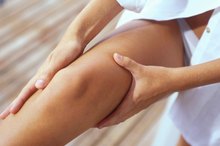Can Certain Vitamins Help Tight Muscles?
Muscle tightness is caused by short, involuntary contractions of the muscles typically due to exercise. Vitamins work together with the other nutrients of the body to improve absorption, circulation and overall function of the muscles, organs and tissues. A deficiency in any number of vitamins due to inadequate nutrient intake or an unbalanced diet may be part of the cause for poor functioning and tightness of the muscles.
Vitamin B
Online-ambulance.com explains that while the direct cause is unknown, deficiencies in B vitamins like thiamine, pantothenic acid and pyroxidine have been linked to muscle cramping and tightness. B vitamins are important in the body because they increases the efficiency of oxygen utilization in the muscles. Fortified cereals, poultry, red meat and fish are good food sources for B vitamin consumption.
Vitamin C
Vitamins for Swimmers
Learn More
Vitamin C increases the absorption of minerals in the body that are used for muscle contraction including calcium, iron and magnesium. A deficiency in vitamin C, therefore, can inhibit proper muscle function and cause muscle tightness or cramping. You can obtain vitamin C from citrus fruit, broccoli, brussel sprouts, strawberries, cabbage and spinach.
Vitamin D
A common deficiency found in older people, Vitamin D can help discomfort and aching in the muscles. Vitamin D also helps in the absorption and utilization of calcium in the blood, which is required to soften and relax the muscles when they begin to cramp or tighten. The main source for vitamin D is from direct sunlight. You should get at least 15 minutes of direct sunlight each day, as vitamin D is synthesized in the skin from ultraviolet B-rays from the sun. Food sources rich in vitamin D include tuna and salmon.
- A common deficiency found in older people, Vitamin D can help discomfort and aching in the muscles.
Vitamin E
Nutritional Cause of Stiff Leg Muscles
Learn More
Vitamin E is commonly known for its antioxidant value. Vitamin E protects the tissues in the body from damage done by toxins. Vitamin E also protects muscle strength, and one symptom of vitamin E deficiency is muscle cramping. Vitamin E can be found in vegetable oils like olive oil, nuts and dried fruits, fresh fruit, vegetables and some meats.
- Vitamin E is commonly known for its antioxidant value.
- Vitamin E protects the tissues in the body from damage done by toxins.
Related Articles
References
- Online-Ambulance: Muscle Cramps
- Home Remedies for You: Leg Cramps Because of Vitamin Deficiency
- U.S. National Library of Medicine. MedlinePlus. Vitamins. Reviewed February 2, 2019.
- U.S. National Library of Medicine. MedlinePlus. Vitamin D Deficiency.
- U.S. National Library of Medicine. MedlinePlus. Vitamin B12 deficiency anemia. Reviewed January 19, 2018.
- U.S. National Library of Medicine. MedlinePlus. Pellagra. Reviewed October 12, 2018.
- National Institute of Neurological Disorders and Stroke. Restless Legs Syndrome Fact Sheet.
- Vici G, Belli L, Biondi M, Polzonetti V. Gluten free diet and nutrient deficiencies: A review. Clin Nutr. 2016;35(6):1236-1241. doi:10.1016/j.clnu.2016.05.002
- Wacker M, Holick MF. Sunlight and Vitamin D: A global perspective for health. Dermatoendocrinol. 2013;5(1):51-108. doi:10.4161/derm.24494
- Crohn’s & Colitis Foundation. Vitamin and Mineral Supplementation.
- Foundation for Peripheral Neuropathy. Vitamin B12 Deficiency Neuropathy.
- U.S. National Library of Medicine. MedlinePlus. Vitamin B Test. Updated May 28, 2019.
- International Foundation for Gastrointestinal Disorder. Malabsorption.
- Diab L, Krebs NF.Vitamin Excess and Deficiency.Pediatr Rev. 2018 Apr;39(4):161-179. doi: 10.1542/pir.2016-0068.
- Thomas-Valdés S, Tostes MDGV, Anunciação PC, da Silva BP, Sant'Ana HMP.Association between vitamin deficiency and metabolic disorders related to obesity.Crit Rev Food Sci Nutr. 2017 Oct 13;57(15):3332-3343. doi: 10.1080/10408398.2015.1117413.
Writer Bio
Alexis Jenkins writes to motivate others in areas of health including nutrition, fitness training and improving lifestyle choices. She graduated with a Bachelor of Science in health science from Brigham Young University-Idaho.








